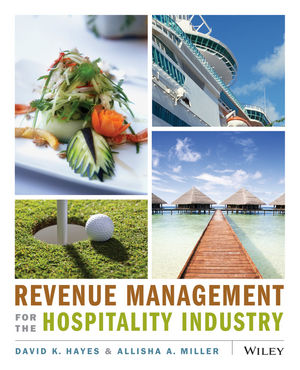|
Textbook
Revenue Management for the Hospitality IndustryISBN: 978-0-470-39308-6
Paperback
528 pages
November 2010, ©2011
 |
||||||
Preface vii
Acknowledgments xv
Part I : Revenue Management Principles 1
Chapter 1: Introduction to Revenue Management 2
Introduction 3
The Purpose of Business 5
The Purpose of Revenue Management 11
The Purpose and Design of This Book 12
Chapter 2: Strategic Pricing 35
What Is a Price? 36
The Importance of Price in the 4 Ps of the Marketing Mix 45
The Role of Supply and Demand in Pricing 49
The Role of Costs in Pricing 53
Implementing Strategic Pricing 61
Chapter 3: Value 68
The Role of Value in Pricing 69
The Relationship Between Quality and Price 75
The Relationship Between Service and Price 77
The Link Between Quality, Service, and Price 79
The Art and Science of Strategic Pricing 84
Chapter 4: Differential Pricing 91
Ten Principles of Managing Revenue 92
Differential Pricing 93
Limits to Differential Pricing 99
Applying Differential Pricing 103
Revenue Management or Revenue Optimization? 121
Chapter 5: The Revenue Manager’s Role 129
The Revenue Manager in the Hospitality Industry 130
Legal Aspects of Revenue Management 133
Ethical Aspects of Revenue Management 139
The Revenue Manager Position 147
The Revenue Management Team 156
Part II : Revenue Management For Hoteliers 163
Chapter 6: Forecasting Demand 164
The Importance of Demand Forecasting 165
Historical Data 167
Current Data 174
Future Data 185
Demand Forecasts and Strategic Pricing 193
Chapter 7: Inventory and Price Management 208
The Marketing Mix Revisited 209
Inventory Management 209
Characterizing Rooms for Optimum Inventory Management 212
Designing Unique Room Codes 215
Classifying Guests by Market Segment 216
Overbooking as an Inventory Management Strategy 227
Price Management 233
Stay Restrictions 249
Principles of Inventory and Price Management 251
Chapter 8: Distribution Channel Management 259
Managing Distribution Channels 260
Nonelectronic Distribution Channels 268
Electronic Distribution Channels 278
Principles of Distribution Channel Management 298
Chapter 9: Evaluation of Revenue Management Efforts in Lodging 306
The Lodging Revenue Paradox 307
STAR Reports 318
Competitive Set Analysis 325
Market Share Analysis 332
Additional Assessments 335
Common-Sense Revenue Optimization 340
Part III: Revenue Management For Foodservice Operators 349
Chapter 10: Revenue Management for Food and Beverage Services 350
Traditional Foodservice Pricing Methods 351
The Cost Against Cost-Based Foodservice Pricing 359
Applying Differential Pricing in Foodservices 364
Factors Affecting Value Perceptions in Foodservices 373
Chapter 11: Evaluation of Revenue Management Efforts in Food and Beverage Services 391
Food and Beverage Revenue Analysis 392
Examination of Revenue Sources 393
Measurement of Revenue Change 399
Evaluation of Revenue-Generating Efficiency 409
The Revenue Evaluation Process in Foodservices 420
Part IV: Revenue Management In Action 429
Chapter 12: Specialized Applications of Revenue Management 430
Characteristics of Organizations Applying Revenue Management 431
Service Industries Applying Revenue Optimization Strategies 440
Specialized Revenue Management Duties 441
Revenue Management and Destination Marketing 450
Chapter 13: Building Better Business 458
Keys to Building Better Business 459
Better Business Issues in Moderate to Strong Markets 472
Better Business Issues in Weak or Distressed Markets 480
Index 503



